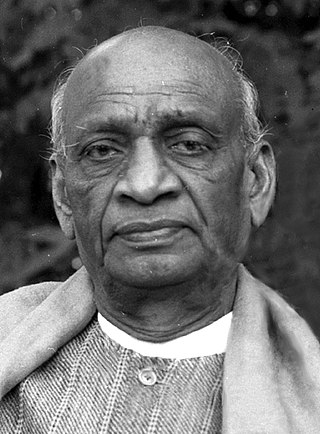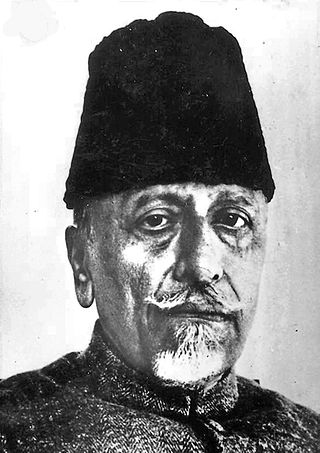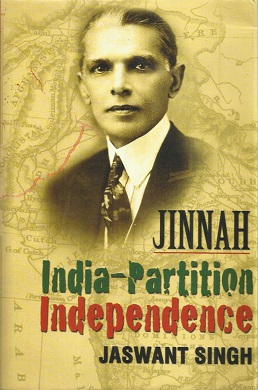
Vallabhbhai Jhaverbhai Patel, commonly known as Sardar Patel, was an Indian lawyer, influential political leader, barrister and statesman who served as the first Deputy Prime Minister and Home Minister of India from 1947 to 1950. He was a barrister and a senior leader of the Indian National Congress, who played a leading role in the country's struggle for independence, guiding its integration into a united, independent nation. In India and elsewhere, he was often called Sardar, meaning "chief" in Hindi, Urdu, Bengali and Persian. He acted as the Home Minister during the political integration of India and the Indo-Pakistani War of 1947.

The Partition of India in 1947 was the change of political borders and the division of other assets that accompanied the dissolution of the British Raj in South Asia and the creation of two independent dominions: India and Pakistan. The Dominion of India is today the Republic of India, and the Dominion of Pakistan—which at the time comprised two regions lying on either side of India—is now the Islamic Republic of Pakistan and the People's Republic of Bangladesh. The partition was outlined in the Indian Independence Act 1947. The change of political borders notably included the division of two provinces of British India, Bengal and Punjab. The majority Muslim districts in these provinces were awarded to Pakistan and the majority non-Muslim to India. The other assets that were divided included the British Indian Army, the Royal Indian Navy, the Royal Indian Air Force, the Indian Civil Service, the railways, and the central treasury. Self-governing independent India and Pakistan legally came into existence at midnight on 14–15 August 1947.

Abdul Ghaffār Khān, also known as Bacha Khan or Badshah Khan, and honourably addressed as Fakhr-e-Afghan, was a Pashtun independence activist, and founder of the Khudai Khidmatgar resistance movement against British colonial rule in India. He was a political and spiritual leader known for his nonviolent opposition and lifelong pacifism; he was a devout Muslim and an advocate for Hindu–Muslim unity in the subcontinent. Due to his similar ideologies and close friendship with Mahatma Gandhi, Khan was nicknamed Sarhadi Gandhi. In 1929, Khan founded the Khudai Khidmatgar, an anti-colonial nonviolent resistance movement. The Khudai Khidmatgar's success and popularity eventually prompted the colonial government to launch numerous crackdowns against Khan and his supporters; the Khudai Khidmatgar experienced some of the most severe repression of the entire Indian independence movement.

Liaquat Ali Khan, also referred to in Pakistan as Quaid-e-Millat or Shaheed-e-Millat, was a Pakistani statesman, lawyer, political theorist, and one of the leading founding fathers of Pakistan. On 15 August 1947, one day after independence, Khan became the first prime minister of Pakistan; he also held cabinet portfolio as the first foreign minister, defence minister, and frontier regions minister from 1947 until his assassination in 1951. Prior to the part, Khan briefly tenured as Finance minister of British India in the Interim Government that undertook independence of Pakistan and India, led by Louis Mountbatten, the then-Viceroy of India.

Sir Khawaja Nazimuddin was a Pakistani politician and one of the leading founding fathers of Pakistan. He is noted as being the first Bengali to have governed Pakistan, first as a Governor-General (1948–51), and later as a Prime Minister (1951–53).

Abul Kalam Ghulam Muhiyuddin Ahmed bin Khairuddin Al-Hussaini Azad was an Indian independence activist, Islamic theologian, writer and a senior leader of the Indian National Congress. Following India's independence, he became the First Minister of Education in the Indian government. He is commonly remembered as Maulana Azad; the word Maulana is an honorific meaning 'Our Master' and he had adopted Azad (Free) as his pen name. His contribution to establishing the education foundation in India is recognised by celebrating his birthday as National Education Day across India.

The Pakistan Movement was a political movement in the first half of the 20th century that aimed for the creation of Pakistan from the Muslim-majority areas of British India. It was connected to the perceived need for self-determination for Muslims under British rule at the time. Muhammad Ali Jinnah, a barrister and politician led this movement after the Lahore Resolution was passed by All-India Muslim League on 23 March 1940 and Ashraf Ali Thanwi as a religious scholar supported it. Thanwi's disciples Shabbir Ahmad Usmani and Zafar Ahmad Usmani were key players in religious support for the creation of Pakistan.

The Radcliffe Line was the boundary demarcated between the Indian and Pakistani portions of the Punjab Province and Bengal Presidency of British India. It was named after Cyril Radcliffe, who, as the joint chairman of the two boundary commissions for the two provinces, had the ultimate responsibility to equitably divide 175,000 square miles (450,000 km2) of territory with 88 million people.
Jinnah House is an unoccupied house in Malabar Hill, a premium neighbourhood of the city of Mumbai in India associated with Muhammad Ali Jinnah, the founder of Pakistan. It is also known as South Court and Malabar Hill mansion. It was built by Mohammad Ali Jinnah and remained his main residence for 10 years until he left in 1946 for Karachi.

The Lahore Resolution, also called Pakistan resolution, was written and prepared by Muhammad Zafarullah Khan and was presented by A. K. Fazlul Huq, the Prime Minister of Bengal, was a formal political statement adopted by the All-India Muslim League on the occasion of its three-day general session in Lahore on 22–24 March 1940. The resolution called for independent states as seen by the statement:
That geographically contiguous units are demarcated regions which should be constituted, with such territorial readjustments as may be necessary that the areas in which the Muslims are numerically in a majority as in the North Western and Eastern Zones of (British) India should be grouped to constitute ‘independent states’ in which the constituent units should be autonomous and sovereign.

The Dominion of India, officially the Union of India, was an independent dominion in the British Commonwealth of Nations existing between 15 August 1947 and 26 January 1950. Until its independence, India had been ruled as an informal empire by the United Kingdom. The empire, also called the British Raj and sometimes the British Indian Empire, consisted of regions, collectively called British India, that were directly administered by the British Crown, and regions, called the princely states, that were ruled by Indian princes under a system of paramountcy. The Dominion of India was formalised by the passage of the Indian Independence Act 1947, which also formalised an independent Dominion of Pakistan—comprising the regions of British India that are today Pakistan and Bangladesh. The Dominion of India remained "India" in common parlance but was geographically reduced. Under the Act, the British government relinquished all responsibility for administering its former territories. The government also revoked its treaty rights with the rulers of the princely states and advised them to join in a political union with India or Pakistan. Accordingly, the British monarch's regional title, "Emperor of India," was abandoned.

The Dominion of Pakistan, officially Pakistan, was an independent federal dominion in the Commonwealth of Nations, existing between 14 August 1947 and 23 March 1956, created by the passing of the Indian Independence Act 1947 by the British parliament, which also created an independent Dominion of India.
The following is a timeline of the Kashmir conflict, a territorial conflict between India, Pakistan and, to a lesser degree, China. India and Pakistan have been involved in four wars and several border skirmishes over the issue.
Events from the year 1947 in Pakistan.

Shekhar Gupta is an Indian journalist and author. He is the founder and the current editor-in-chief of ThePrint. He is also a columnist for the Business Standard and pens a weekly column which appears every Saturday.

Jinnah: India-Partition-Independence is a book written by Jaswant Singh, a former Finance Minister of India and an External Affairs Minister, on Pakistan's founder Quaid-e-Azam Muhammad Ali Jinnah and the politics associated with the Partition of India. It is currently the latest book written by an Indian politician on the life of Jinnah. The book was released on 17 August 2009 and soon became the subject of controversy, subsequently leading to Singh's expulsion from the Bhartiya Janata Party (BJP). It contains controversial opinions of Singh, claiming that Pandit Jawaharlal Nehru's centralised policy was responsible for partition, and that Jinnah was portrayed as a demon by India for the partition. The book launch ceremony was held at Teen Murti Bhavan in the presence of only a couple of BJP members.

Muhammad Ali Jinnah was a barrister, politician and the founder of Pakistan. Jinnah served as the leader of the All-India Muslim League from 1913 until the inception of Pakistan on 14 August 1947, and then as the Dominion of Pakistan's first governor-general until his death. He is revered in Pakistan as the Quaid-i-Azam and Baba-i-Qaum. His birthday is observed as a national holiday in Pakistan.
Bibi Amtus Salam was a social worker and disciple of Mohandas Gandhi who played an active role in combating communal violence in the wake of the Partition of India and in the rehabilitation of refugees who came to India following partition.
Begum Zaffar Ali, née Sahibzaadi Syeda Fatima, was an Indian women's rights activist and the first woman matriculate of the Indian state of Kashmir and Jammu who went on to become Inspector of Schools in Kashmir. She was an educationist, women's liberation activist, Deputy Director of education and later a legislator in the Indian state of Jammu and Kashmir. She was associated with the activities of the All India Women’s Conference and was its secretary before partition, but a chance meeting with Muhammad Ali Jinnah and his sister, Fatima Jinnah in Kashmir, who would later visit the family for banquets, influenced her and she left the conference to concentrate her efforts in women's liberation movements in the pre-independent India.

Opposition to the partition of India was widespread in British India in the 20th century and it continues to remain a talking point in South Asian politics. Those who opposed it often adhered to the doctrine of composite nationalism. The Hindu, Christian, Anglo-Indian, Parsi and Sikh communities were largely opposed to the partition of India, as were many Muslims.














